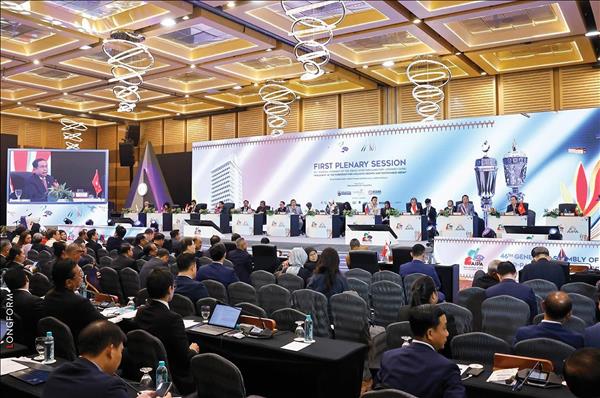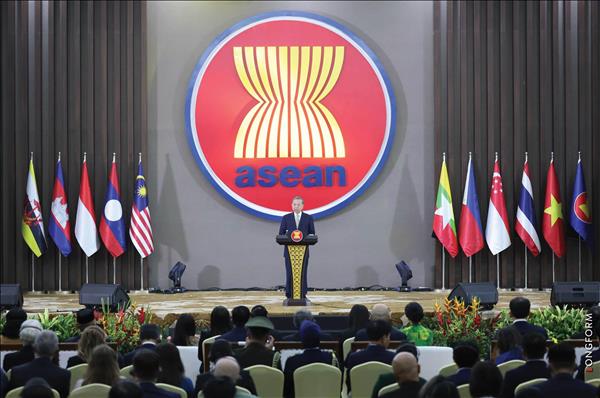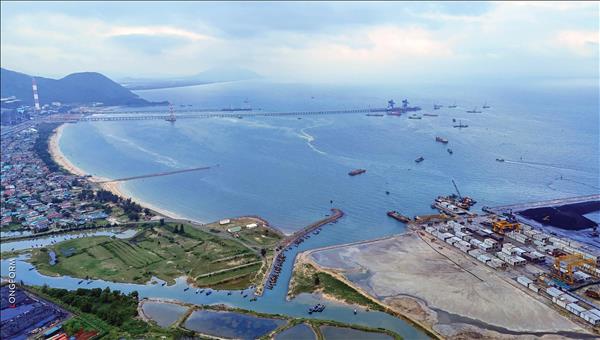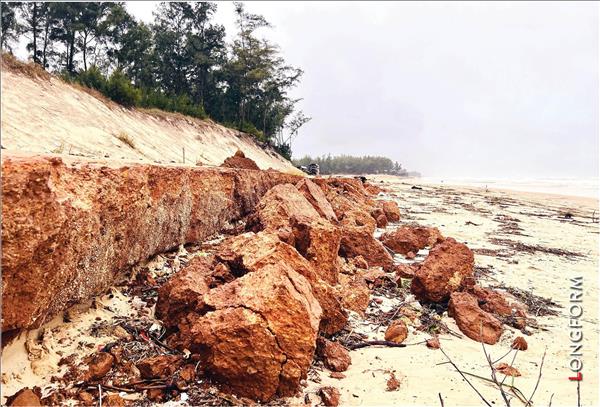Leaders of the two sides have reviewed the ASEAN-China cooperation in the past three decades and devise orientations for the new period to deepen their relations so as to match the comprehensive strategic partnership, established during the 24th ASEAN-China Summit held in October.
Vietnam pledges more contributions to ASEAN - China ties
Chinese President Xi Jinping has announced the establishment of the China-ASEAN comprehensive strategic partnership as he chaired the Special Summit to Commemorate the 30th Anniversary of China-ASEAN Dialogue Relations via videoconference.
Leaders of ASEAN member states highly appreciated the fact that General Secretary and President of China Xi Jinping attended the Summit between ASEAN and China for the first time, demonstrating the concern and respect of China's top leaders for ASEAN.
Welcoming the important achievements since 1991, the two sides assessed the ASEAN-China relationship as a mutually beneficial, dynamic and substantive partnership. The announcement of the establishment of the Comprehensive Strategic Partnership by ASEAN and China demonstrated the important results achieved in the comprehensive cooperation between the two sides over the past 30 years.
Speaking at the summit, PM Chinh said the new partnership framework was indicative of the outcomes of cooperation between the two sides over the last 30 years.
ASEAN and China should continue consolidating strategic trust and fostering comprehensive cooperation in order to amplify past achievements and achieve greater goals and benefits in their bilateral ties.
Voicing support for major cooperation orientations proposed by the participating leaders, the Prime Minister underscored the importance of core factors like working together to sustain peace, stability and development in a changing environment and forging closer cooperation to effectively cope with new global challenges for comprehensive and inclusive development, prosperity, safety and sustainability for both sides.
He called for enhanced dialogue, trust consolidation, observation of international law, and responsible behaviour of all countries for full implementation of the Declaration on the Conduct of Parties in the South China Sea (DOC) and early conclusion of a working, substantive, and effective Code of Conduct for the South China Sea that is in line with international law and the 1982 United Nations Convention on the Law of the Sea (UNCLOS 1982).
He expressed his hope that ASEAN and China would soon restore and beef up economic, trade and investment cooperation, suggesting China facilitate the import of ASEAN goods towards balanced trade ties.
Addressing the summit, Xi said: “China-ASEAN dialogue relations have gone through an extraordinary journey over the past three decades,” adding that the strategic partnership is a new milestone in the history of China-ASEAN relations and will inject new impetus into peace, stability, prosperity and development of the region and the world.
Regarding the future relations between China and ASEAN, Xi made several proposals.
First, pursuing dialogue instead of confrontation, building partnerships instead of alliances, and making concerted efforts to address the various negative factors that might threaten or undermine peace.
“China pursues long-term, friendly coexistence with neighbouring countries, and is part of the common efforts for durable peace in the region. China will never seek hegemony, still less bully smaller countries,” he said.
Second, he said China would be ready to work with ASEAN countries to jointly build a "health shield" for the region, including donating an additional 150 million doses of COVID vaccines to ASEAN countries and US$5 million to the COVID-19 ASEAN Response Fund. The Chinese leader also mentioned support for ASEAN in strengthening primary-level public health systems and tackling other traditional and non-traditional security challenges.
Third, he proposed making effective use of the Regional Comprehensive Economic Partnership (RCEP), upgrading the ASEAN-China Free Trade Agreement (ACFTA), promoting economic integration, trade liberalisation, expansion of cooperation in science, technology and innovation.
Other proposals include digital economy and green economy, green investment and finance.
The summit affirmed that peace, security and stability in the region, including the East Sea, are the common concerns and interests of countries. On that foundation, the countries vowed to fully and effectively implement the DOC and exert efforts to build a substantive and effective COC that is in keeping with international law and the 1982 United Nations Convention on the Law of the Sea (UNCLOS).
The sides agreed on the holding of a special summit marking the 30th anniversary of the ASEAN-China relations.
The summit concluded with the adoption of the ASEAN-China Joint Statement on Cooperation in Support of the ASEAN Comprehensive Recovery Framework and another on Enhancing Green and Sustainable Development Cooperation.
ASEAN - China Strategic Partnership
The ASEAN-China relationship has been realized through many mechanisms including the annual summit, ministerial meetings, and five-year action plans.
China has fully participated in regional mechanisms initiated and led by ASEAN, affirming the organisation’s central role and solidarity in regional cooperation processes and supporting ASEAN to uphold its role at international multilateral forums.
ASEAN and China signed the Declaration on the Conduct of Parties in the East Sea (DOC) in November 2002 and vowed to exert efforts to fully and effectively implement the DOC and accelerate the building of an effective and practical Code of Conduct in the East Sea (COC) that is in accordance with international law, including the 1982 United Nations Convention on the Law of the Sea (UNCLOS).
Two-way trade surged 80-fold in the past 30 years. China was the largest trade partner of ASEAN in 2009-21 and the bloc became China’s leading trade partner for the first time last year.
China was the fourth biggest FDI investor of ASEAN in 2020, with 7.6 billion USD.
China donated 1 million USD for the COVID-19 ASEAN Response Fund and committed to earmarking 5 million USD from the ASEAN-China cooperation fund for public health programmes and projects in collaboration with ASEAN.
As an active member of ASEAN, Vietnam serves as a gateway to the ASEAN-China free trade area. Vietnam-China trade revenue posted an average growth rate of 20 percent annually in the past five years./.
Vietnam pledges more contributions to ASEAN - China ties
Chinese President Xi Jinping has announced the establishment of the China-ASEAN comprehensive strategic partnership as he chaired the Special Summit to Commemorate the 30th Anniversary of China-ASEAN Dialogue Relations via videoconference.
Leaders of ASEAN member states highly appreciated the fact that General Secretary and President of China Xi Jinping attended the Summit between ASEAN and China for the first time, demonstrating the concern and respect of China's top leaders for ASEAN.
Welcoming the important achievements since 1991, the two sides assessed the ASEAN-China relationship as a mutually beneficial, dynamic and substantive partnership. The announcement of the establishment of the Comprehensive Strategic Partnership by ASEAN and China demonstrated the important results achieved in the comprehensive cooperation between the two sides over the past 30 years.
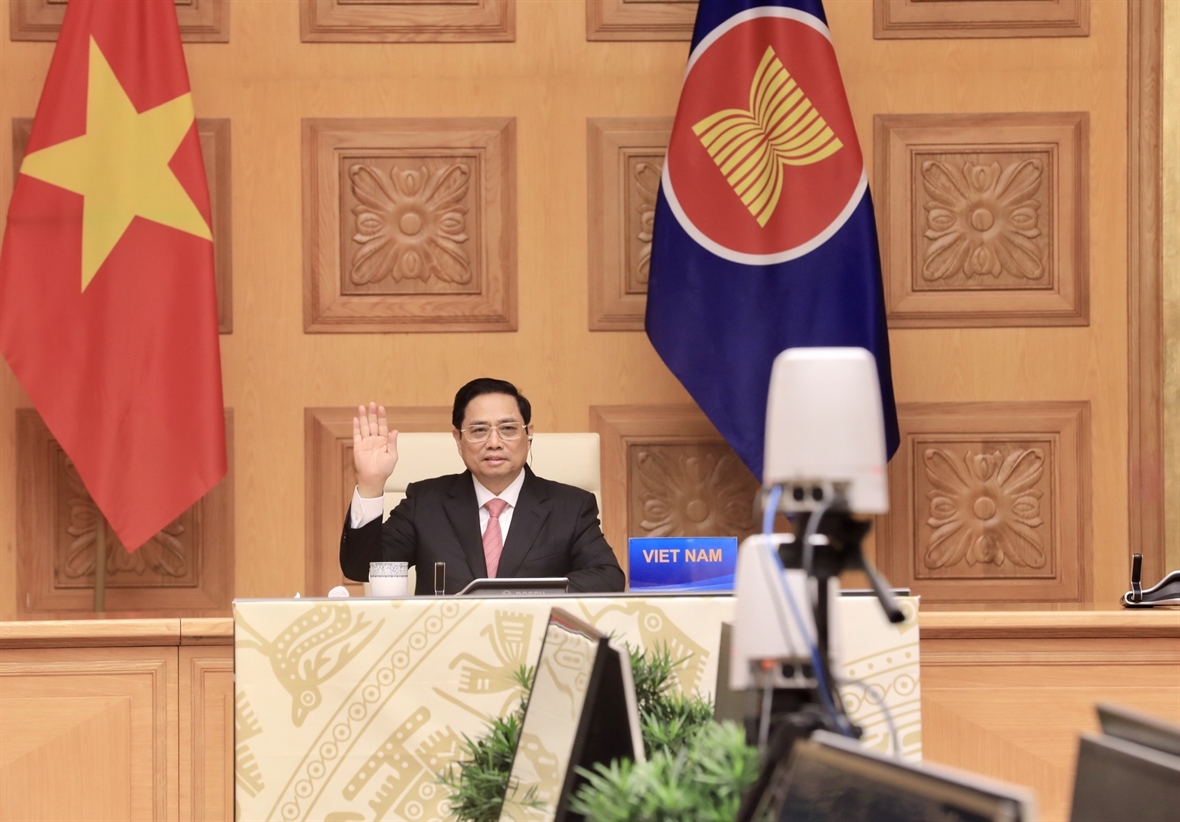 Prime Minister Pham Minh Chinh at the ASEAN-China Special Summit. Photo: Lam Khanh/VNA 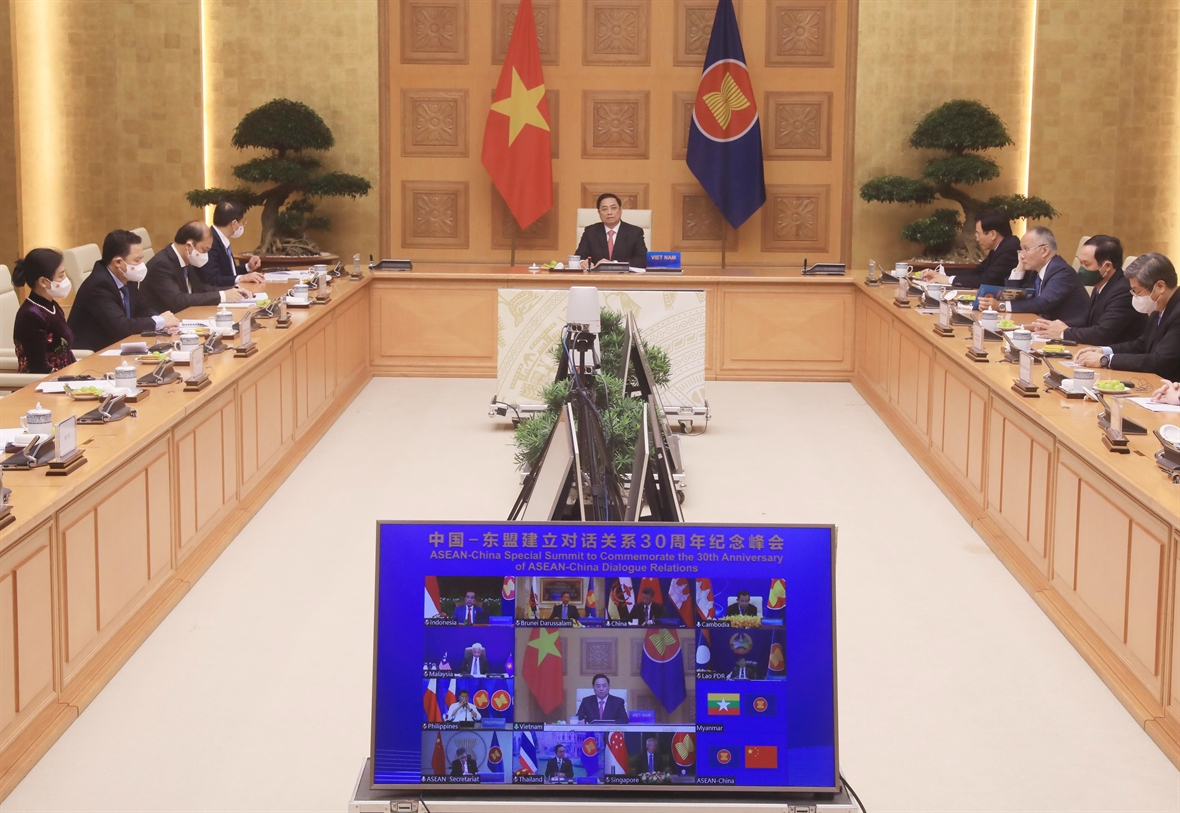 Prime Minister Pham Minh Chinh attends the ASEAN-China Special Summit commemorating the 30th year of the ASEAN-China Dialogue Relations, held virtually. Photo: Lam Khanh/VNA 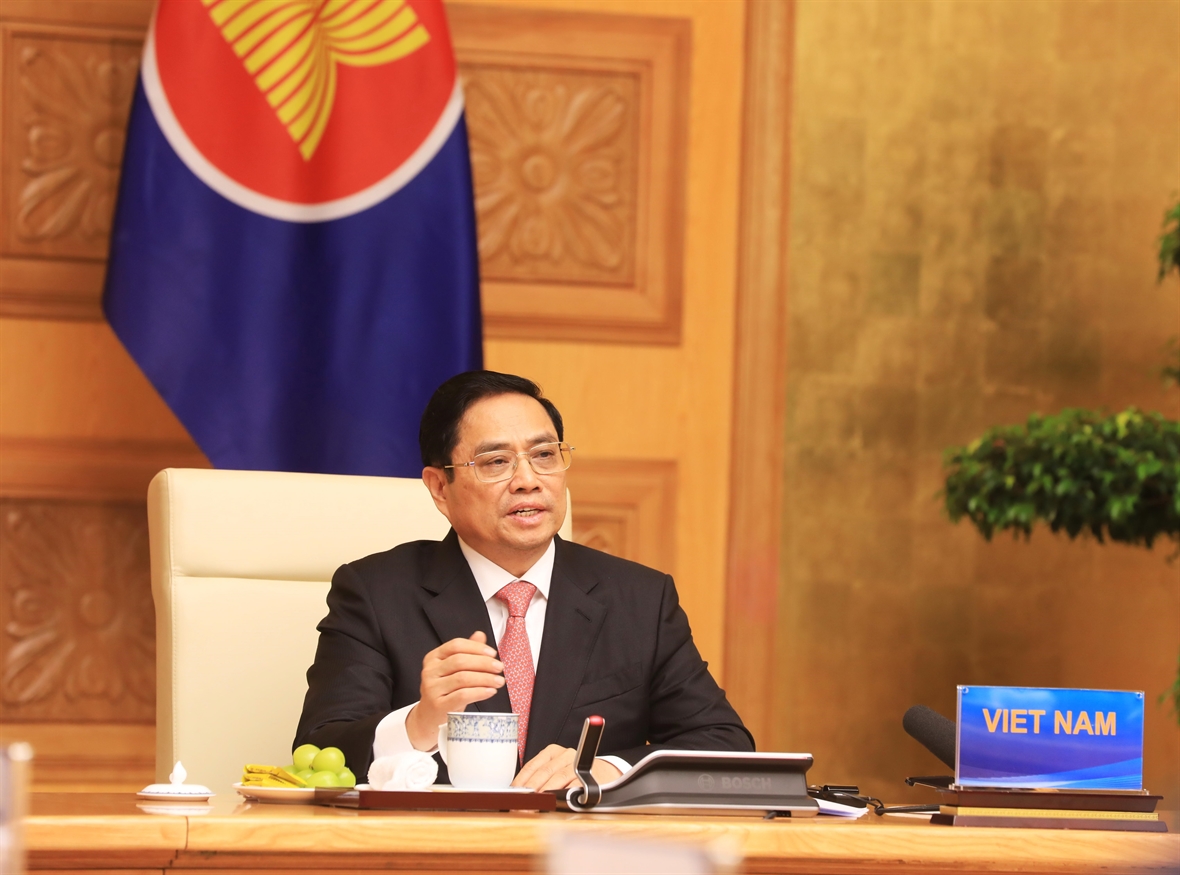 PM Pham Minh Chinh speaks at the event. Photo: Lam Khanh/VNA |
Speaking at the summit, PM Chinh said the new partnership framework was indicative of the outcomes of cooperation between the two sides over the last 30 years.
ASEAN and China should continue consolidating strategic trust and fostering comprehensive cooperation in order to amplify past achievements and achieve greater goals and benefits in their bilateral ties.
Voicing support for major cooperation orientations proposed by the participating leaders, the Prime Minister underscored the importance of core factors like working together to sustain peace, stability and development in a changing environment and forging closer cooperation to effectively cope with new global challenges for comprehensive and inclusive development, prosperity, safety and sustainability for both sides.
He called for enhanced dialogue, trust consolidation, observation of international law, and responsible behaviour of all countries for full implementation of the Declaration on the Conduct of Parties in the South China Sea (DOC) and early conclusion of a working, substantive, and effective Code of Conduct for the South China Sea that is in line with international law and the 1982 United Nations Convention on the Law of the Sea (UNCLOS 1982).
| China wishes to build a peaceful, safe, prosperous, beautiful and amicable home together with ASEAN. |
He expressed his hope that ASEAN and China would soon restore and beef up economic, trade and investment cooperation, suggesting China facilitate the import of ASEAN goods towards balanced trade ties.
Addressing the summit, Xi said: “China-ASEAN dialogue relations have gone through an extraordinary journey over the past three decades,” adding that the strategic partnership is a new milestone in the history of China-ASEAN relations and will inject new impetus into peace, stability, prosperity and development of the region and the world.
Regarding the future relations between China and ASEAN, Xi made several proposals.
First, pursuing dialogue instead of confrontation, building partnerships instead of alliances, and making concerted efforts to address the various negative factors that might threaten or undermine peace.
“China pursues long-term, friendly coexistence with neighbouring countries, and is part of the common efforts for durable peace in the region. China will never seek hegemony, still less bully smaller countries,” he said.
Second, he said China would be ready to work with ASEAN countries to jointly build a "health shield" for the region, including donating an additional 150 million doses of COVID vaccines to ASEAN countries and US$5 million to the COVID-19 ASEAN Response Fund. The Chinese leader also mentioned support for ASEAN in strengthening primary-level public health systems and tackling other traditional and non-traditional security challenges.
Third, he proposed making effective use of the Regional Comprehensive Economic Partnership (RCEP), upgrading the ASEAN-China Free Trade Agreement (ACFTA), promoting economic integration, trade liberalisation, expansion of cooperation in science, technology and innovation.
Other proposals include digital economy and green economy, green investment and finance.
The summit affirmed that peace, security and stability in the region, including the East Sea, are the common concerns and interests of countries. On that foundation, the countries vowed to fully and effectively implement the DOC and exert efforts to build a substantive and effective COC that is in keeping with international law and the 1982 United Nations Convention on the Law of the Sea (UNCLOS).
The sides agreed on the holding of a special summit marking the 30th anniversary of the ASEAN-China relations.
The summit concluded with the adoption of the ASEAN-China Joint Statement on Cooperation in Support of the ASEAN Comprehensive Recovery Framework and another on Enhancing Green and Sustainable Development Cooperation.
ASEAN - China Strategic Partnership
The ASEAN-China relationship has been realized through many mechanisms including the annual summit, ministerial meetings, and five-year action plans.
China has fully participated in regional mechanisms initiated and led by ASEAN, affirming the organisation’s central role and solidarity in regional cooperation processes and supporting ASEAN to uphold its role at international multilateral forums.
ASEAN and China signed the Declaration on the Conduct of Parties in the East Sea (DOC) in November 2002 and vowed to exert efforts to fully and effectively implement the DOC and accelerate the building of an effective and practical Code of Conduct in the East Sea (COC) that is in accordance with international law, including the 1982 United Nations Convention on the Law of the Sea (UNCLOS).
 Prime Minister Pham Minh Chinh, General Secretary and President of China Xi Jinping and leaders of ASEAN member states attend the summit. Photo: Lam Khanh/VNA 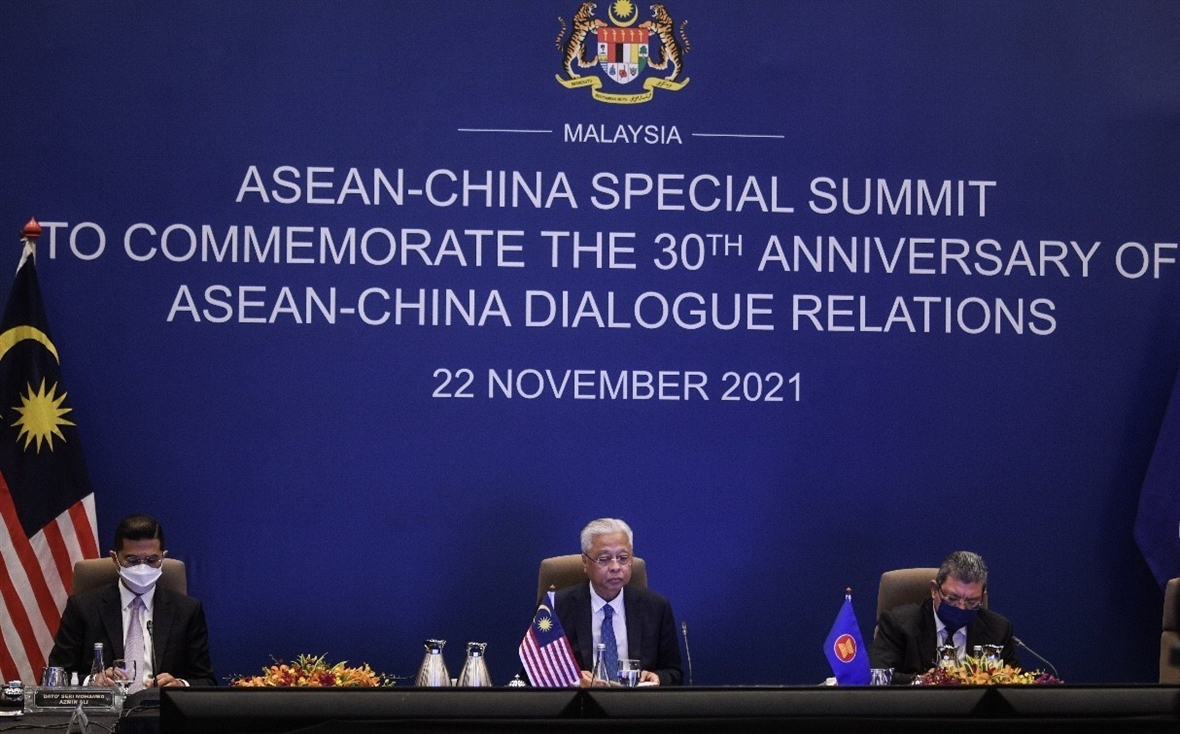
At the summit, Malaysian Prime Minister Ismail Sabri Yaakob has affirmed his country's consistent position the issues concerning the East Sea. Photo: Manh Tuan/VNA
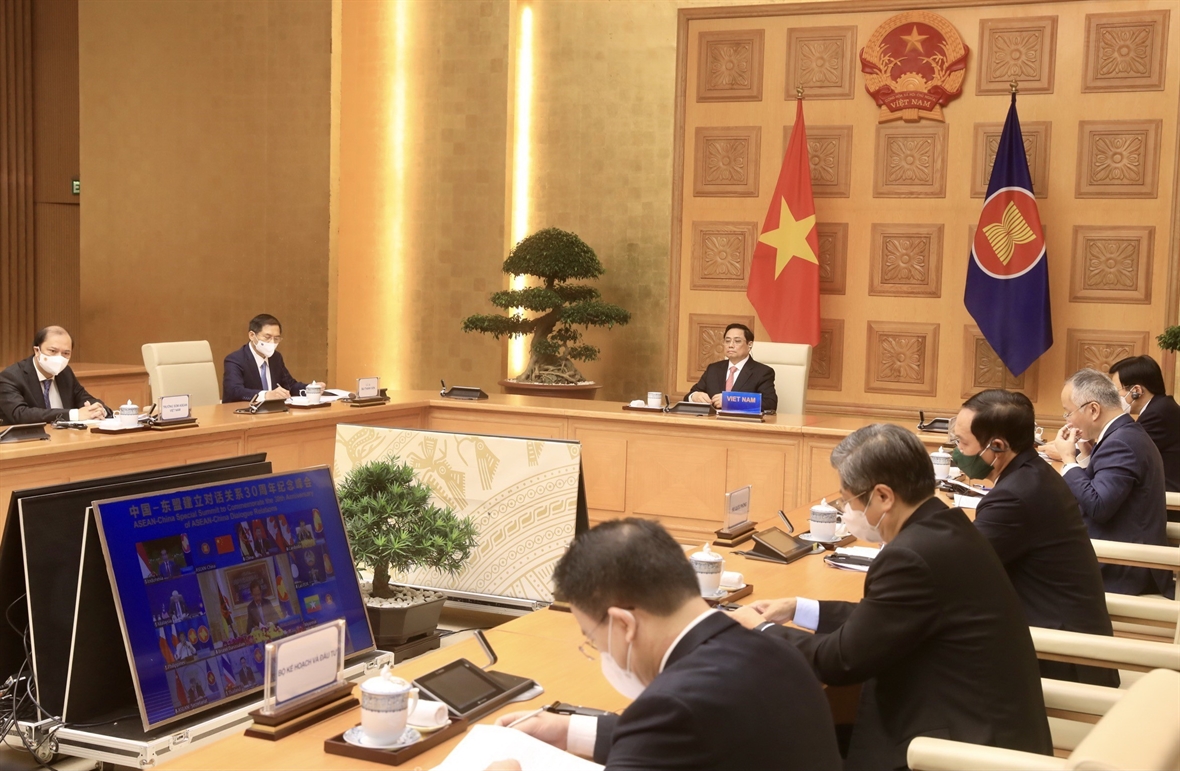 PM Pham Minh Chinh at the ASEAN-China Special Summit commemorating the 30th year of the ASEAN-China Dialogue Relations. Photo: Lam Khanh/VNA  |
Two-way trade surged 80-fold in the past 30 years. China was the largest trade partner of ASEAN in 2009-21 and the bloc became China’s leading trade partner for the first time last year.
| ASEAN and China set up their ties in 1991 and upgraded the relations to a strategic partnership in October 2003. ASEAN and China adopted the Strategic Partnership Vision 2030 at the 21st ASEAN-China (ASEAN+1) leaders' meeting held in Singapore in 2018. |
China was the fourth biggest FDI investor of ASEAN in 2020, with 7.6 billion USD.
China donated 1 million USD for the COVID-19 ASEAN Response Fund and committed to earmarking 5 million USD from the ASEAN-China cooperation fund for public health programmes and projects in collaboration with ASEAN.
As an active member of ASEAN, Vietnam serves as a gateway to the ASEAN-China free trade area. Vietnam-China trade revenue posted an average growth rate of 20 percent annually in the past five years./.
VNA/VNP



